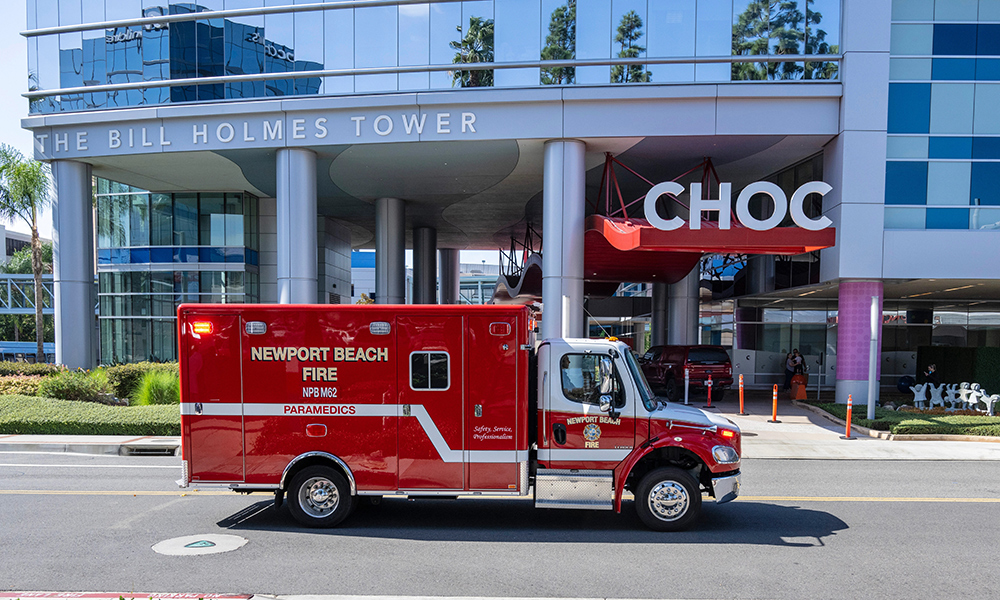
今年秋季,流感,、呼吸道合胞病毒(RSV)和新冠病毒導(dǎo)致的“三重疫情”令北美兒童醫(yī)院達(dá)到極限,。有些兒童醫(yī)院迫切需要額外空間和人手,甚至考慮在停車場設(shè)立“臨時帳篷”,,并向美國國民警衛(wèi)隊(National Guard)求助,。
圣迭戈雷迪兒童醫(yī)院(Rady Children’s Hospital-San Diego)尚未面臨這樣的困境。該醫(yī)院的高級副總裁兼首席運(yùn)營官,、小兒泌尿科醫(yī)生尼古拉斯·霍爾姆斯博士對《財富》雜志表示,,該醫(yī)院可能需要在近期執(zhí)行應(yīng)對計劃。
目前,,該醫(yī)院采取了一些創(chuàng)造性的措施,,以應(yīng)對激增的患者數(shù)量。該醫(yī)院將靠近急診室的禮品商店臨時改造成患者分流區(qū),,游戲區(qū)被改造成了兒童護(hù)理區(qū),。一間依舊配有吸氧接口的舊新生兒重癥監(jiān)護(hù)室也被重新改造。
醫(yī)院的領(lǐng)導(dǎo)層和行政人員,,例如霍爾姆斯,,也開始在急診室輪班,以接替疲倦的護(hù)士,。他們都是取得執(zhí)照的醫(yī)護(hù)從業(yè)人員,,只是一直沒有執(zhí)業(yè)。
霍爾姆斯告訴《財富》雜志:“我還可以給孩子們送毯子和發(fā)冰棒,,這樣就能夠讓護(hù)士們專心做好自己的本職工作,?!?/p>
“這種情況前所未見”
不止雷迪兒童醫(yī)院面臨這樣的狀況。上周,,呼吸道疾病患者激增,,包括與流感類似的鼻病毒和腸道病毒等,使附近的奧蘭治縣達(dá)到了極限,。當(dāng)?shù)匦歼M(jìn)入公共健康緊急狀態(tài),。在這種狀態(tài)下,當(dāng)?shù)爻松暾堉莺吐?lián)邦援助以外,,還可以向周邊郡縣求助,。
奧蘭治縣兒童醫(yī)院(Children’s Hospital of Orange County)上周對《財富》雜志表示,該醫(yī)院正在利用所有可用空間,,并成立了一個指揮中心,,負(fù)責(zé)管理病患負(fù)荷量。
華盛頓特區(qū)國立兒童醫(yī)院(Children’s National Hospital)的重癥護(hù)理醫(yī)生阿妮塔·帕特爾博士在上周告訴《財富》雜志,,在東海岸,,“幾乎每一家大型”兒科醫(yī)院都人滿為患。她所在的醫(yī)院已經(jīng)接近滿負(fù)荷運(yùn)轉(zhuǎn)超過一個月,。
她表示,,為了應(yīng)對增多的患者,該醫(yī)院成立了一個由高水平ICU醫(yī)生組成的額外團(tuán)隊,,對需要住院但必須在急診室等待騰出床位的兒童進(jìn)行治療,。
芝加哥大學(xué)附屬科默兒童醫(yī)院(University of Chicago Medicine Comer Children’s Hospital)的兒科ICU副醫(yī)學(xué)總監(jiān)賈森·凱恩博士對《財富》雜志表示,他的醫(yī)院在過去24小時已經(jīng)滿員,。該醫(yī)院收治了從其他醫(yī)院急診室轉(zhuǎn)院的30名兒童患者,,但拒收了60名患者。
芝加哥很幸運(yùn),,在當(dāng)?shù)剡€有其他兒童醫(yī)院,,但許多地區(qū)并沒有這么幸運(yùn)。關(guān)鍵在于:凱恩表示,,科墨兒童醫(yī)院最近收治的轉(zhuǎn)院患者來自艾奧瓦州,、密蘇里州、威斯康辛州,、印第安納州和肯塔基州,。
“我在ICU工作了一周。這種情況是前所未見的,,我從業(yè)22年來從未遇到過這樣的情況,。”
兒科醫(yī)生的心理創(chuàng)傷和“道德困境”
美國兒科護(hù)理危機(jī)正在蔓延到加拿大,,這背后的原因到底是什么,?
原因是今年北美流感季提前來臨,。澳大利亞今年早些時候爆發(fā)嚴(yán)重甲流,尤其是兒童受到嚴(yán)重影響,,整個北半球都是類似的狀況,。更糟糕的是,呼吸道合胞病毒感染達(dá)到了地方性流行病的程度,。而且美國的新冠疫情還尚未結(jié)束,。
霍爾姆斯告訴《財富》雜志:“兒科護(hù)理領(lǐng)域的病毒流行季通常在11月末開始,持續(xù)到來年3月,。但今年在夏末就已經(jīng)開始,,過去兩周達(dá)到了最高峰。在四周至六周內(nèi),,流感將接踵而至,,使患者數(shù)量進(jìn)一步增加?!?/p>
但他認(rèn)為,,兒科醫(yī)院容量危機(jī)背后的一些問題,與病毒傳播無關(guān),。美國新生兒出生率下降,,這意味著在兒科醫(yī)院病房住院的兒童患者減少,。有些醫(yī)院最近關(guān)閉或者裁撤了兒科部門,,因?yàn)樗鼈儾痪哂小柏攧?wù)可行性”。
成人醫(yī)院的員工由于缺乏兒童護(hù)理經(jīng)驗(yàn),,會快速將兒童患者轉(zhuǎn)運(yùn)到兒童醫(yī)院,。但美國的兒科醫(yī)療護(hù)理系統(tǒng)的能力始終不足。據(jù)美國醫(yī)院協(xié)會(American Hospital Association)統(tǒng)計,,今年美國社區(qū)醫(yī)院的兒童重癥監(jiān)護(hù)床位,,不足編制床位數(shù)量的1%。
凱恩回想起新冠疫情爆發(fā)的第一年,,當(dāng)時成人醫(yī)院不堪重負(fù),。他回憶說:“當(dāng)時許多兒童醫(yī)院貢獻(xiàn)出床位收治成年患者。
兩年半以后,,當(dāng)兒科醫(yī)療系統(tǒng)不堪重負(fù)的時候,,我是說整個美國,卻沒有醫(yī)院愿意貢獻(xiàn)出成人床位來收治兒童患者,?!?/p>
成人醫(yī)院今年秋天同樣處境艱難。聯(lián)邦健康官員在11月4日稱,,美國的流感住院人數(shù)達(dá)到過去十年的最高水平,。他們還介紹了應(yīng)對各年齡段呼吸道疾病患者激增的方案,,包括部署軍方和美國聯(lián)邦應(yīng)急管理署(FEMA)的人員,提供呼吸機(jī)等物資,。
凱恩表示,,無論美國的醫(yī)療保健系統(tǒng)因?yàn)槭裁丛蛳萑虢裉爝@種困境,兒科醫(yī)療保健服務(wù)提供者都承受了巨大的情感壓力,。
“我有一些朋友是普通兒科醫(yī)生,,他們的診所人滿為患,但他們不能拒絕患者,。目前所出現(xiàn)的各種問題,,令整個兒科醫(yī)學(xué)界陷入了道德困境?!保ㄘ敻恢形木W(wǎng))
譯者:劉進(jìn)龍
審校:汪皓
今年秋季,,流感、呼吸道合胞病毒(RSV)和新冠病毒導(dǎo)致的“三重疫情”令北美兒童醫(yī)院達(dá)到極限,。有些兒童醫(yī)院迫切需要額外空間和人手,,甚至考慮在停車場設(shè)立“臨時帳篷”,并向美國國民警衛(wèi)隊(National Guard)求助,。
圣迭戈雷迪兒童醫(yī)院(Rady Children’s Hospital-San Diego)尚未面臨這樣的困境,。該醫(yī)院的高級副總裁兼首席運(yùn)營官、小兒泌尿科醫(yī)生尼古拉斯·霍爾姆斯博士對《財富》雜志表示,,該醫(yī)院可能需要在近期執(zhí)行應(yīng)對計劃,。
目前,該醫(yī)院采取了一些創(chuàng)造性的措施,,以應(yīng)對激增的患者數(shù)量,。該醫(yī)院將靠近急診室的禮品商店臨時改造成患者分流區(qū),游戲區(qū)被改造成了兒童護(hù)理區(qū),。一間依舊配有吸氧接口的舊新生兒重癥監(jiān)護(hù)室也被重新改造,。
醫(yī)院的領(lǐng)導(dǎo)層和行政人員,例如霍爾姆斯,,也開始在急診室輪班,,以接替疲倦的護(hù)士。他們都是取得執(zhí)照的醫(yī)護(hù)從業(yè)人員,,只是一直沒有執(zhí)業(yè),。
霍爾姆斯告訴《財富》雜志:“我還可以給孩子們送毯子和發(fā)冰棒,這樣就能夠讓護(hù)士們專心做好自己的本職工作,?!?/p>
“這種情況前所未見”
不止雷迪兒童醫(yī)院面臨這樣的狀況。上周,呼吸道疾病患者激增,,包括與流感類似的鼻病毒和腸道病毒等,,使附近的奧蘭治縣達(dá)到了極限。當(dāng)?shù)匦歼M(jìn)入公共健康緊急狀態(tài),。在這種狀態(tài)下,,當(dāng)?shù)爻松暾堉莺吐?lián)邦援助以外,還可以向周邊郡縣求助,。
奧蘭治縣兒童醫(yī)院(Children’s Hospital of Orange County)上周對《財富》雜志表示,,該醫(yī)院正在利用所有可用空間,并成立了一個指揮中心,,負(fù)責(zé)管理病患負(fù)荷量,。
華盛頓特區(qū)國立兒童醫(yī)院(Children’s National Hospital)的重癥護(hù)理醫(yī)生阿妮塔·帕特爾博士在上周告訴《財富》雜志,在東海岸,,“幾乎每一家大型”兒科醫(yī)院都人滿為患,。她所在的醫(yī)院已經(jīng)接近滿負(fù)荷運(yùn)轉(zhuǎn)超過一個月。
她表示,,為了應(yīng)對增多的患者,,該醫(yī)院成立了一個由高水平ICU醫(yī)生組成的額外團(tuán)隊,對需要住院但必須在急診室等待騰出床位的兒童進(jìn)行治療,。
芝加哥大學(xué)附屬科默兒童醫(yī)院(University of Chicago Medicine Comer Children’s Hospital)的兒科ICU副醫(yī)學(xué)總監(jiān)賈森·凱恩博士對《財富》雜志表示,,他的醫(yī)院在過去24小時已經(jīng)滿員。該醫(yī)院收治了從其他醫(yī)院急診室轉(zhuǎn)院的30名兒童患者,,但拒收了60名患者,。
芝加哥很幸運(yùn),在當(dāng)?shù)剡€有其他兒童醫(yī)院,,但許多地區(qū)并沒有這么幸運(yùn),。關(guān)鍵在于:凱恩表示,,科墨兒童醫(yī)院最近收治的轉(zhuǎn)院患者來自艾奧瓦州,、密蘇里州、威斯康辛州,、印第安納州和肯塔基州,。
“我在ICU工作了一周。這種情況是前所未見的,,我從業(yè)22年來從未遇到過這樣的情況,。”
兒科醫(yī)生的心理創(chuàng)傷和“道德困境”
美國兒科護(hù)理危機(jī)正在蔓延到加拿大,,這背后的原因到底是什么,?
原因是今年北美流感季提前來臨。澳大利亞今年早些時候爆發(fā)嚴(yán)重甲流,尤其是兒童受到嚴(yán)重影響,,整個北半球都是類似的狀況,。更糟糕的是,呼吸道合胞病毒感染達(dá)到了地方性流行病的程度,。而且美國的新冠疫情還尚未結(jié)束,。
霍爾姆斯告訴《財富》雜志:“兒科護(hù)理領(lǐng)域的病毒流行季通常在11月末開始,持續(xù)到來年3月,。但今年在夏末就已經(jīng)開始,,過去兩周達(dá)到了最高峰。在四周至六周內(nèi),,流感將接踵而至,,使患者數(shù)量進(jìn)一步增加?!?/p>
但他認(rèn)為,,兒科醫(yī)院容量危機(jī)背后的一些問題,與病毒傳播無關(guān),。美國新生兒出生率下降,,這意味著在兒科醫(yī)院病房住院的兒童患者減少。有些醫(yī)院最近關(guān)閉或者裁撤了兒科部門,,因?yàn)樗鼈儾痪哂小柏攧?wù)可行性”,。
成人醫(yī)院的員工由于缺乏兒童護(hù)理經(jīng)驗(yàn),會快速將兒童患者轉(zhuǎn)運(yùn)到兒童醫(yī)院,。但美國的兒科醫(yī)療護(hù)理系統(tǒng)的能力始終不足,。據(jù)美國醫(yī)院協(xié)會(American Hospital Association)統(tǒng)計,今年美國社區(qū)醫(yī)院的兒童重癥監(jiān)護(hù)床位,,不足編制床位數(shù)量的1%,。
凱恩回想起新冠疫情爆發(fā)的第一年,當(dāng)時成人醫(yī)院不堪重負(fù),。他回憶說:“當(dāng)時許多兒童醫(yī)院貢獻(xiàn)出床位收治成年患者,。
兩年半以后,當(dāng)兒科醫(yī)療系統(tǒng)不堪重負(fù)的時候,,我是說整個美國,,卻沒有醫(yī)院愿意貢獻(xiàn)出成人床位來收治兒童患者?!?/p>
成人醫(yī)院今年秋天同樣處境艱難,。聯(lián)邦健康官員在11月4日稱,美國的流感住院人數(shù)達(dá)到過去十年的最高水平,。他們還介紹了應(yīng)對各年齡段呼吸道疾病患者激增的方案,,包括部署軍方和美國聯(lián)邦應(yīng)急管理署(FEMA)的人員,,提供呼吸機(jī)等物資。
凱恩表示,,無論美國的醫(yī)療保健系統(tǒng)因?yàn)槭裁丛蛳萑虢裉爝@種困境,,兒科醫(yī)療保健服務(wù)提供者都承受了巨大的情感壓力。
“我有一些朋友是普通兒科醫(yī)生,,他們的診所人滿為患,,但他們不能拒絕患者。目前所出現(xiàn)的各種問題,,令整個兒科醫(yī)學(xué)界陷入了道德困境,。”(財富中文網(wǎng))
譯者:劉進(jìn)龍
審校:汪皓
A so-called “tripledemic” of flu, RSV, and COVID is pushing North American children’s hospitals to their limits this fall. Some are so desperate for additional space and staff that they’re considering setting up “surge tents” in parking lots and requesting help from the National Guard.
Rady Children’s Hospital-San Diego isn’t quite there—yet. But the hospital may need to implement such a plan in the near future, Dr. Nicholas Holmes, a pediatric urologist and the hospitals’ senior vice president and chief operating officer, told Fortune.
For now, it’s using creative measures to deal with a record surge of patients. The hospital has temporarily turned its gift shop, located near the emergency department, into a patient triage room. Play areas have been transformed into patient care areas. And an old neonatal intensive care unit that still has hookups for oxygen administration has been repurposed.
Leadership and administrative staff like Holmes, who are licensed health care professionals but not practicing, have begun working shifts in the emergency department to free up weary nurses.
“I can still pass out blankets and give popsicles to kids,” Holmes told Fortune. “It allows nurses to do what they need to be able to do—nursing.”
“I’ve never seen anything like this”
Rady Children’s isn’t alone. A surge in respiratory illnesses—including influenza-like illnesses like rhinovirus and enterovirus—pushed nearby Orange County to its limit last week. The jurisdiction declared a public health emergency, which allowed it to request aid from nearby counties, in addition to state and federal assistance.
One children’s hospital there, Children’s Hospital of Orange County, told?Fortune?last week that it was using all available space, and had activated a command center to manage the patient load.
On the East Coast, “almost every single major” pediatric hospital is full, Dr. Anita Patel, a critical care doctor at Children’s National hospital in Washington, D.C., told?Fortune?last week. Her hospital has been operating close to capacity for over a month.
To cope with the increased patient load, the hospital formed an additional team of high-level ICU doctors to care for children who need admission, but who must stay in the ER until beds open up, she said.
Dr. Jason Kane, associate medical director of the pediatric ICU at the University of Chicago Medicine Comer Children’s Hospital, told Fortune that his facility was full over the past 24 hours. It managed to admit 30 children from other hospitals’ emergency departments that needed beds, but still had to turn away 60.
Chicago has the “l(fā)uxury” of having other children’s hospitals in the city, but many areas aren’t so lucky. Case in point: Recent transfers to Comer Children’s have come from as far away as Iowa, Missouri, Wisconsin, Indiana, and Kentucky, he said.
“I just finished a week in the ICU. I’ve never seen anything like this, and I’ve been doing this for about 22 years.”
For pediatric doctors, trauma and “moral distress”
What’s behind the U.S. pediatric care crisis, sweeping as far north as Canada?
Flu season began early this year in North America. In Australia, which was hit hard by Influenza A earlier this year, children were especially impacted—a pattern playing out in the Northern Hemisphere as well. Compounding things, pediatric hospitals are seeing epidemic levels of RSV, or respiratory syncytial virus infection. And the U.S. is still in the middle of a COVID pandemic, or epidemic, depending on your views.
“Normally in pediatric health care, the viral season starts in late November and extends to March,” Holmes told Fortune. “This year it started in late summer and has peaked within the last couple of weeks. In four to six weeks the flu will come on top of that and push volumes even higher.”
But there are issues behind the pediatric hospital capacity crisis that have nothing to do with circulating viruses, according to Kane. The birth rate is down in the U.S., meaning fewer children are filling pediatric hospital beds. Some hospitals have recently closed or cut their pediatric programs because they weren’t “fiscally viable.”
Adult hospitals are quick to ship kids off to children’s hospitals because their staff lacks experience in caring for them. But the U.S. pediatric health care system doesn’t always have the bandwidth. Children’s intensive care beds make up less than 1% of staffed beds in community hospitals this year, according to the American Hospital Association.
Kane thinks back to COVID’s first year, when adult hospitals were overwhelmed. “Many children’s hospitals gave up beds to put adults in them,” he recalled.
“Now, two and a half years later when the pediatric system is overwhelmed—and I’m speaking about the whole country—there isn’t a willingness for adult beds to be sacrificed to put children in them.”
Adult hospitals are struggling this fall too. The U.S. is experiencing higher flu hospitalizations than it has in more than a decade, federal health officials said on November 4. They outlined plans to deploy troops and FEMA personnel, and supplies like ventilators, if needed, in response to a surge in respiratory illnesses among all age groups.
However the nation’s health care system arrived at this point, the emotional burden on the community of pediatric health care providers is profound, Kane says.
“My general pediatrician friends have offices that are overwhelmed with kids coming in, but they need to be seen. So many things are going on right now that are causing moral distress to the entire pediatric community.”






